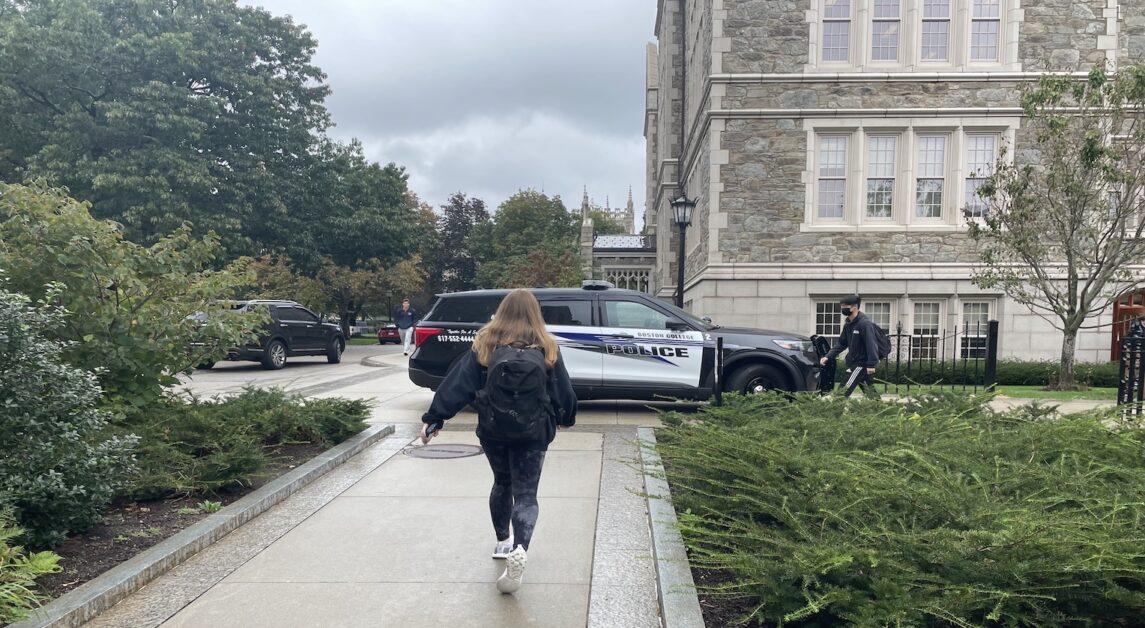Boston College reported nine rape offenses in 2020, according to the University’s Annual Campus Security and Fire Safety Report on Sept. 30, marking a decrease from the 23 reported offenses in 2019 and 19 reported offenses in 2018.
The change in reported rape offenses could be a result of the COVID-19 pandemic, said Melinda Stoops, associate vice president for student health and wellness and student affairs Title IX coordinator.
“We have fewer people on campus, and with COVID measures, fewer gatherings or cases where we might see some activities that sexual violence may be more likely to occur,” Stoops said. “So our numbers were down and I think that makes sense given the context of the year.”
The Clery report also listed 13 reports of fondling, one report of arson, and five reports of burglary. There were another 45 disciplinary referrals for drug law violations and 646 referrals for liquor law violations—both marking a sizable decrease from the previous year.
The Clery Act, a consumer protection law passed in 1990, requires all universities that receive federal funding to publish statistics of the occurrences of 15 crimes, ranging from violent crimes and alcohol violations to Title IX violations, according to the Clery Center.
The University report is important not only for federal compliance, but also for transparency, Stoops said.
“It educates people in our community,” she said. “It also educates people coming to our community. So, whether it’s prospective students or parents or neighbors, it really puts data out there, with regards to crime statistics, so that people are informed.”
Disciplinary referrals for liquor law violations fell by 236 offenses in 2020, and referrals for drug law violations by 53 offenses. There was also one motor vehicle theft in 2020, according to the report.
There were no instances of hate crimes, robberies, aggravated assaults, statutory rape, or incest reported in 2020. Additionally, there were no occurances of manslaughter or murder.
The offenses in the report include those that are reported to campus security authorities and occur on campus, at non-campus properties, and at public properties, the report said.
Stoops said the offenses collected in the report mostly occur on campus, though, since the Clery Act has strict criteria for what qualifies as a non-campus offense.
Of the nine rape offenses, six occured in on-campus housing facilities. The 13 reported offenses of fondling in 2020 marked an increase from the seven reported offenses in 2019 and 21 in 2018. Eleven of the fondling occurrences happened in on-campus housing.
To help prevent situations of sexual violence, especially in residence halls, Stoops suggested that students look out for one another, especially at parties and gatherings.
“So, if you’re with a friend and you feel like maybe they’ve had too much to drink, bring them home,” Stoops said. “If you’re hosting a gathering just [be] responsible, again, for looking around and making sure people seem okay.”
The University also reported three domestic violence offenses, five dating violence offenses, and five stalking offenses in 2020, according to the report.
Stoops said institutional fears, like fear of punishment, can cause underreporting. Also, she said, students might have personal reasons to not report. Twenty-eight percent of the most serious offenses of sexual misconduct at universities go unreported, according to a 2015 study published by the Association of American Universities.
“So, for some people, they may really feel that at that point in time that the thought of having to describe to someone what happened or to tell someone what happened may feel very overwhelming,” Stoops said.
Aside from reporting statistics, the report also outlined the University’s Campus Sexual Violence Response and Prevention Program.
“Sexual violence or sexual misconduct of any kind is antithetical to the mission of Boston College and the values it espouses and will be responded to accordingly,” the report writes. “The University strives to eliminate sexual misconduct on campus, prevent its occurrence, and address its effects.”
The University encourages students and employees to report sex offenses to the BC Police Department and the Office of Student Conduct, as well as reaching out to the Sexual Assault Network and the SANet Care Team.
Stoops said students experiencing dating or domestic violence can also reach out to the counseling center, or a care team available within the Women’s Center, among other resources.
“We have a care team that’s housed in the Women’s Center, and they are available to work with anyone who has experienced sexual violence,” Stoops said. “They are designed to really serve as an advocate for the student in terms of helping them get resources, helping them sort of navigate a situation but also provide some short-term support and guidance around coping strategies.”
To combat sexual violence on the institutional levels, Stoops hopes to continue early training for first-year students about topics like sexual violence and alcohol use, as the two can be interrelated, she said.
“I think the more we can do about reinforcing responsible alcohol use in students goes a long way in lots of different things including sexual violence,” Stoops said.
If you or anyone you know has experienced sexual assault or sexual violence, you can reach out to BCPD at 617-552-4444, the Sexual Assault Network at 617-552-2211, the SANet Care Team at 617-552-8099, and the Office of Student Conduct at 617-552-3470.
Featured Image by Victor Stefanescu / Heights Editor













